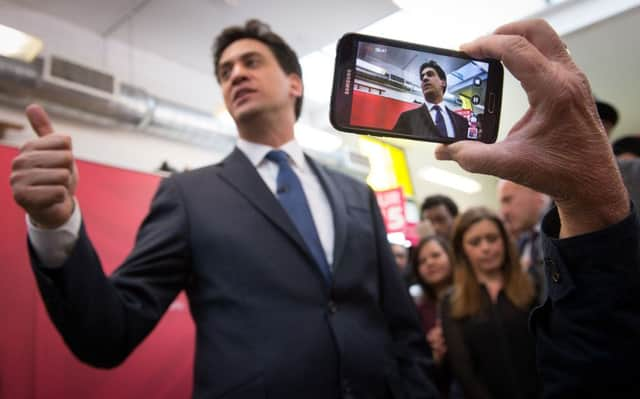Leaders: Deal or no deal not recipe for stability


Yesterday Labour leader Ed Miliband went further than his previous statements in ruling out any deal with the SNP if no party wins an overall majority. “I want to be clear about this”, he declared, “no coalitions, no tie-ins… no deals”.
Barely had this remark hit the news wires than SNP leader Nicola Sturgeon retorted that the Labour leader “will have to change his tune” after the election about not doing a deal with the SNP. She said it was fine for Labour to behave as if the party could win a majority during the campaign – but they would have to face reality afterwards.
Advertisement
Hide AdAdvertisement
Hide AdMs Sturgeon has lost no opportunity to repeat her aim to “lock out” the Conservatives from government. She has offered to work with Mr Miliband on an informal basis to keep the Conservatives out of power. Thus, even if Labour polls fewer votes than the Tories, Ed Miliband could be levered into Downing Street with the help of a hugely increased SNP representation at Westminster.
If the outcome is a hung parliament, with no party obtaining an overall majority, Labour would need some initial appearance of support from the SNP to be able to claim that it can indeed form a government. Were it to secure a majority of seats it could still attempt to form a minority administration. Given the SNP’s predilections, the Labour leader may feel reasonably confident of doing so as it would seem unlikely that SNP MPs would vote to bring down a Labour government and risk triggering another election.
But that is a big gamble for Mr Miliband to take. He would be banking on a minority Labour government winning a bet against the possibility of the SNP bringing it down and letting the Conservatives back in. It is also a gamble on Ms Sturgeon’s part – that if no party has a majority, it is well nigh impossible for the views of other parties to be ignored and that a deal would have to be struck. And by ruling out any deal with the Conservatives she has left herself no option but to deal with Labour.
It is hardly a recipe for political stability. There are divisions between the SNP and Labour on major issues such as the speed of budget deficit reduction and on the Trident nuclear deterrent. The SNP leader has said her opposition to the renewal of Trident is a “red line” issue, while Mr Miliband has made clear Labour would not ditch its commitment to order a new fleet of submarines.
Meanwhile, David Cameron and George Osborne have played on fears of “economic chaos” resulting from a Labour-SNP tie-up. The real question on Mr Miliband now ruling out deals is why it took him this long to do so, and just how much has Cameron achieved by scaring the Tory vote in to coming out.
That’s why we need foreign aid
Foreign aid has been a populist ball to kick around in Britain’s fractious election. Too often it has been cast in a negative light and as a needless addition to government spending.
The weekend’s appalling tragedy in Nepal should change this – and very speedily. Saturday’s earthquake has had a far-reaching impact. It seems certain that more than 2,000 people have lost their lives, with victims in Bangladesh, India, Tibet, and on Mount Everest.
Death tolls and casualty figures are likely to rise over the coming days, and the risk of landslides on slopes made unstable by the quake mean that the danger is far from passed.
Advertisement
Hide AdAdvertisement
Hide AdBritain should always have the resource, the expertise and the compassion to send help. While charities do a wonderful job and are well supported, it is right and proper for the government to take an interest in helping other countries, either in emergencies like this or in helping them to develop.
The Department for International Development says it has already released £3 million to address immediate needs on the ground, and £2 million will be given to the Red Cross.
International Development Secretary Justine Greening says the funds could be fast-tracked to aid workers, enabling them to provide urgently needed supplies including clean water, shelter, household items and blankets. The department is also sending humanitarian experts from the UK to provide urgent support.
How appalling it would be if, faced with human tragedy on this scale we were unable to respond. This is exactly the sort of emergency which an aid budget is designed to address.